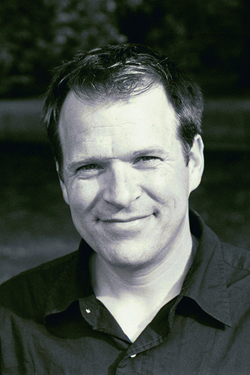Ashokan Farewell
by James Hoch
And so someone’s standing beside you, easel and canvas
articulated in such a manner as to capture whatever the mood
brings, which is, it can be said, pleasantly severe, meaning
a word or two, laughter, might render the moment ruined,
thus petulant quiet, as if the wind could be punished for being.
There’s barely a whiff of paint, and already you are thinking
it is not enough– the angle, the awkwardness of entering,
not enough to mistake the absent wind for silence, to confuse
the pleasure of being beside the face of a reservoir for leisure,
not enough to say the water shimmers in the sun, for really
it only takes what comes: Mohican. Settler. Dam. Flood.
Already, this is a buzz-kill, a slate-gray sky, the mind
wandering into radio blare More than a feeling, More than this,
the music’s easy ebb. Jesus! You can’t help think Jesus–
the clutch of striders Christ-like in their skills and brevity,
or the cross pulled from the church door before the church
was pulled from the valley floor which became a silence.
It violates the day’s etiquette of emptying itself of sound,
even as you hear Irish and West Indians clattering an aqueduct
out of the mountain, their breathing wet with work and curse
to form lake where there was no lake, a sand hog’s lament.
Follow a line long enough you find the litter of history,
bric-a-brac, whisky stash, slaughter by strike, by claim.
And if the line descends, as it does, as it must, beneath,
you go too into field, barn, plough, furnace, the plain church
cold-kilned in silt and sand, its bell swaying over a yard,
the village dead weeping dumbly trying to remember
where they were buried, their faces caught in the slow
rush and draft of human thirst. What would they whisper
back, if they could, if they don’t already, about a century?
But, Ah! Wasn’t it brilliant– a conversion, a drowning,
a cure for tenement and dance hall, – waltz, swing, jitterbug,
break, vogue – as it is now moshing about in the accrual.
If only we could have ceased then stilled in the acid wash
of our own want, so that our bodies carried the trace stench
of our undoing, so that loving each other, wild timid anew,
we would not mistake taint for gift, tungsten for light.
You can think like this forever, so long as there is no end
to narrative. You can bend your face above the mirror
and see what there is to see, so long as your breath
does not disturb the surface with warm rivulets of itself.
There is so long, in everything, and you are there inside
the story, for instance, of drinking water, or the tired self’s
water image; and there you hear your name at last at last
as herons come languid across the sky, slow wing ache,
and not think anything uneasy – arsenic, lead, cadmium –
sickness or crime lay in marrow, in blood run, feather, lung,
that you are not inlaid in figure, in ground, in the colors
someone who has taken care of his pigments brushes on.
Published on April 18, 2011

